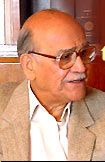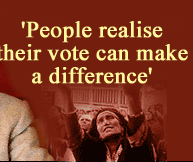The Election Interview/Jammu and Kashmir Governor Girish Chandra Saxena



Having served his post for seven of the 12 years of militancy in Jammu and Kashmir, Girish Chandra Saxena is one of India's longest serving governors.
A former director of the Research and Analysis Wing, 'Gary' Saxena continues to enjoy the confidence of the Indian political establishment across the board, and despite mounting rumours of his impending removal, is confident about retaining his position.
The governor asserts that the election in the state would be successful but admits India will not stick fully to what Prime Minister Atal Bihari Vajpayee said on Independence Day -- that New Delhi would talk only to elected representatives. He said India would continue to hold dialogue with separatists who have boycotted the poll, and will try and get militants back into mainstream.
A day after the first phase of polling, Saxena spoke to Chief Correspondent Josy Joseph at his splendid mansion on the bank of the beautiful Dal Lake in Srinagar.
How do you assess the first phase of polling?
It has been both positive and encouraging than we had expected. Even in the circumstances prevailing I should have thought that anything over 25 per cent would be reasonably good, especially in the valley because of the stepped up violence from the other side. Also there were all the appeals for boycotting, accompanied by threats. They tried to target candidates and political workers, and some of them unfortunately fell to it.
I thought that in the given circumstances anything over 25 per cent would be good. As it happens, it has been around 40 per cent in the valley. So this just confirms what is already known: people not only want to return to normal life, normal economic activity, but they are fed up of this mindless violence. They want peace, normal electoral and political processes.
They also feel that elections provide a very good opportunity for them to elect their executives who may come to govern this state, even constitute the Opposition. So, this is the kind of feeling they have. Their realisation is because of the transparency in the election process and special measures that have been taken. That their vote can make a difference, it will count. That is why we have a better than expected result.
Also, the percentage that have come up vary from district to district, constituency to constituency. They reflect the circumstances and factors operating in those constituencies. They are plausible, and acceptable and credible. So we think that whatever may be the final outcome, the vote through the electronic voting machines would have given out an honest and clear verdict.
The election had a trend, at least visible as of now. There were large turnouts in constituencies such as Handwara where there were fresh candidates, such as the one from the People's Conference. But where the usual run-of-the-mill candidates were repeated, the voting was sloppy.
They wanted, above all, their vote to matter and send up a candidate of their choice. They are focussed more on day to day lives. They want not only better administration, they also want jobs, better services, quicker responses to their grievances. Some of them may be seeing it in the present establishment, some might see that outside.
I also feel they realise the government and the political leadership -- cutting across party lines -- in the country wants a wider participation in the election, an inclusive election. They have tried to bring in all the elements in the political opinion [that] you might characterise as dissidents, secessionists. We wanted them to come in. This is the effort we were making.
Basically, elections not only elect the next government, they also elect the next Opposition. So the ruling combination and the Opposition play an important role in shaping the future political developments in the state. And they give a very good opportunity to establish a representative character through the vote, through the ballot. It was a very good opportunity, and some of them had their own reasons to remain out of it, some came in whatever shape they could.
So this is a positive development that they have faith in Indian democracy, they have faith in the ballot. So this is the thing, the main effort this time was to fully restore the confidence of the electorate in the electoral process. I think in that we made substantial gains.
But some still kept out of the electoral process.
Yes, some kept out. They kept out for reasons of their own. Maybe they are afraid of their physical and political survival. They may also be very apprehensive about their actual following getting exposed. Many of them may not have grassroot support. In many areas where there has been very low percentage of polling are areas where they have a sizeable following. In rest of the places it has been shown that their following is very limited.
How do you read the trends of the first phase?
Sometimes, there is more response in urban areas than in the countryside. Sometime it is the other way around. So it is not going to be a uniform percentage. How much effort a candidate makes, how much appeal candidates have made to voters, how much [of a] conducive environment we have been able to make.
We have to see that the security efforts are maintained, so that people can exercise their franchise. This depends on the stature of the candidate, and the mood in a particular constituency.
If the entire election is as free as in the first phase, then do you foresee a reduction in the tension with Pakistan? Also, will it help in reducing Indian military presence in the Kashmir valley?
I can't speak so much about the external factor, because we are facing not only large scale terrorist violence sponsored from across the border but also a proxy war situation. So it is on the other side how they take the outcome of the elections, and which way the wind is blowing etc. If they moderate their policies accordingly, fine, we will welcome that. If they don't, we will deal with it as effectively as we have been doing. And our response will become more and more effective.
I am more focussed on the impact of the fair and credible election on the internal situation. It will stabilise the political environment. It will make a lot of things possible on the political side of governance. That would also impact developmental and economic activities, also on the security aspect. It will be a very positive development for our efforts on various fronts. That way we will be in a much stronger position to meet the challenges from across the border.
Many voters complained that there was coercion by the army in the first phase of polling. How do you react to it?
They (security forces) are under strict instruction not to pressurise anyone to vote. They are there to create a sense of confidence. Many people wanted to come out, they felt reassured. Many, who didn't want to come out, didn't.
Many a times these people have used this cover of the security forces to escape the retaliation by terrorists or their support later on. They get a good cover: 'What could we do? We were pressurised by the army, so we were forced to vote.' This is what they tell somebody who comes to their house to ask why did they not observe the boycott.
They are vulnerable. Many a time, they say we have come out on our own, but the thing is if they say so in public, they would be targeted tomorrow.
In such a big exercise, we should not generalise. Can you on the basis of one such allegation or half-a-dozen allegations, in the midst of such a big exercise, generalise? Then how come in a whole constituency the poll per cent is less than five per cent? In another constituency it is 10 per cent? If this is a pattern of policy, why is it that vote has fluctuated so much from constituency to constituency? This is something that people have to judge, not on the basis of allegations, some of them are orchestrated.
Design: Lynette Menezes
Back to top
Tell us what you think of this interview